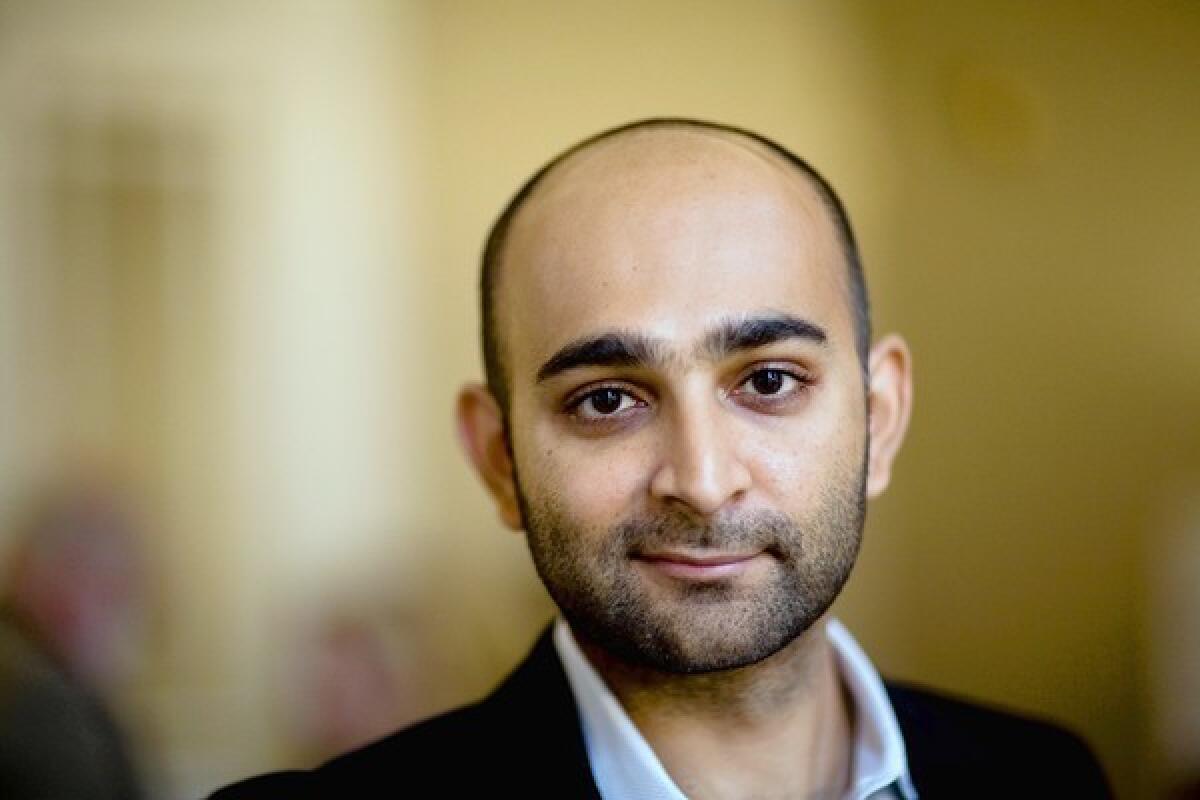Mohsin Hamid comes home to roost in Pakistan

Many of the characters in Mohsin Hamid’s novels are cultural nomads, hopscotching between the Islamic world and the Western capitalist world, the spiritual and the material, Urdu and English, the undernourished countryside and the teeming mega-city.
It’s a territory — “limbo” might be another term — that’s intimately familiar to the 41-year-old author, who was born in Pakistan, partially raised in Northern California, educated at Princeton and Harvard, spent time in New York and long resided in England.
“The four places I’ve called home in my life have been Lahore, London, New York and California. And I have a very strong tie to each one of those four places,” said Hamid, speaking by phone from Chicago last week during a promotional tour that will bring him to the Central Library’s Aloud talk series Thursday night.
Now back living in his native Lahore, a Pakistani border city of 10 million, Hamid is comfortable letting his imagination reside in several places and genres simultaneously. The latest evidence is his new novel, “How to Get Filthy Rich in Rising Asia,” which masquerades as a self-help book that some Wall Street investment whiz might’ve cooked up.
Complete with jokey, cynical chapter headings (“Get an Education,” “Avoid Idealists”), it chronicles an unnamed man’s rags-to-riches ascent from rural peasant and DVD delivery boy to corporate tycoon in a country that is not quite Pakistan. Told in the second-person “You,” it seemingly advertises itself as a Horatio Alger tale for incurable nonromantics, a meaner, leaner (228 pages) “Great Expectations” for the age of ravenous global capital.
However, even more than the single-minded pursuit of wealth, the novel is concerned with love, specifically the passionate admiration and lust that the book’s anonymous narrator feels for a pretty girl. If “The Great Gatsby,” another self-made-man saga, is really an Arthurian romance dolled up in flapper dresses and straw boater hats, Hamid’s third novel is a sort of Sufi secular poetic tract and a story about a beloved that, as he puts it, proposes a response “to this predicament we’re all finding ourselves in.”
As to what precisely that predicament is, well, don’t look to Hamid or his books, which include “Moth Smoke” (2000) and “The Reluctant Fundamentalist” (2007), for facile answers. Clearly, though, it has something to do with love and family. And sex and drugs. And East-West tensions. And rural upheaval resulting in mass migration to mega-cities. And India-Pakistan nuclear rivalries. And global warming and drone warfare. For starters, anyway.
“Moth Smoke,” which was modeled on Albert Camus’ “The Fall” and is set in an apocalyptic Lahore, relates the tale of an ex-banker who falls for his best friend’s wife and spirals downward into a heroin-addicted life of crime. It made Hamid’s writerly reputation after he’d graduated with high honors from Princeton University (where he studied with Toni Morrison) and later picked up a Harvard Law School degree.
Hamid’s equally lauded follow-up, “The Reluctant Fundamentalist,” takes place at a cafe table in Lahore, where a bearded Pakistani man regales a squirmy U.S. visitor with the story of how his former glamorous Manhattan life crumbled after Sept. 11. It’s a Graham Greene-like cautionary fable for financial jihadists and ideological terrorists of all stripes. A movie adaptation, directed by Mira Nair and starring Riz Ahmed, Kate Hudson, Kiefer Sutherland and Liev Schreiber, is scheduled for release this spring.
Although Hamid’s fictional works vary in style and substance, a distinctive sensibility pervades all three: simultaneously warm and ironic, elegant and profane, urbane but equipped with a strong B.S. detector.
“I think there’s an appropriate voice for each story, and it takes me years” to find it, Hamid says. “It’s like being a character actor. I just try speaking like the voice I want to do, until I find it.”
Hamid says that returning to Lahore 31/2 years ago allowed him to disconnect from the New York-London literary swirl and reconnect with daily, multi-generational family life. That was good preparation for writing “How to Get Filthy Rich.”
“I wrote this book in my late 30s, which is kind of a midpoint in life,” he says, “while living in a house where we had an apartment upstairs, my wife, my two children and myself, and downstairs from us are my parents, who are in their late 60s. That spurred me to create a novel that was interested in the arc of life and in family dynamics and children and old age.”
Although the new book’s form owes a debt to epic Victorian novels and self-promotional advice tomes, Hamid insists that its true literary ancestor is the Sufi love poem: “The Sufi poem, sort of Sufism in a nutshell, is Islamic mysticism where love is used as the prism for relating to the universe. And it generally expresses itself in the form of love poems, which are second-person addresses, very often, and quite often nameless second-person addresses.”
Elaborating on his plan for the book’s scope, Hamid says, “I wanted to write a big, sprawling, 19th-century, 800-page book, but I didn’t want it to be much longer than 200 pages.” That’s partly because he wants to write work that won’t unnerve young readers weaned on tweets and YouTube videos. “For me, the project is to not have literature be in a ghetto,” he says.
Last month, Hamid was among the conveners of the inaugural Lahore Literary Festival, which drew 25,000 people. Hamid believes that literature, and the novelistic form in particular, remains an essential invention. In a global media culture filled with dogma and flash-mob opinion-mongering, he suggests, the novel still offers something unique.
“Only in novels can we take another human being into our head and create something jointly,” he says. “So that really is central to what I’m trying to do, and I think that is something which young people respond to. Because our society is all about ‘should.’ You should be like this and you should be like that. And people, I think, are sick of it.”
Mohsin Hamid
In conversation with novelist David Treuer
What: The Aloud Series
Where: Mark Taper Auditorium, Los Angeles Central Library
When: 7:15 p.m. Thursday
Info: https://www.lfla.org/calendar/
More to Read
Sign up for our Book Club newsletter
Get the latest news, events and more from the Los Angeles Times Book Club, and help us get L.A. reading and talking.
You may occasionally receive promotional content from the Los Angeles Times.









